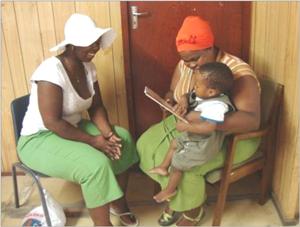Book sharing could boost prospects of world's poorest children
Release Date 18 May 2012
Teaching parents how to share books with their infants could have a dramatic effect on improving literacy rates in developing countries, University of Reading researchers have found.
Psychologists from the University of Reading, together with colleagues in South Africa, have secured funding to begin a major study of book sharing in informal urban communities on the outskirts of Cape Town.
Successes in a pilot study indicate that extending simple techniques, already well established in developed countries, to developing nations could help to boost the educational prospects of some of the world's poorest children.
With around nine million illiterate adults, and still entrenched divisions in educational attainment between pupils from rich and poor backgrounds, there is considerable concern in South Africa about literacy rates among schoolchildren.
Researchers say that while the government has urged families to become more involved in the education of their children, there is so far no coherent plan for supporting parents in such involvement.
One initiative, not yet explored in South Africa, is providing training to mothers in sharing books with their infants.
Now researchers from the University of Reading's School of Psychology and Clinical Language Sciences are about to embark on a year-long trial, exploring how training mothers to share books with their children aids their educational development.
"Within the developed world there is a wealth of research evidence demonstrating that early book sharing predicts better language and literacy skills," said Professor Peter Cooper, from the University of Reading.
"Furthermore, studies of training programmes aimed at improving the quality of adult book sharing have consistently shown that these are effective, and that, compared to other kinds of parent training, they are associated with greater gains in infants' language skills. But the potential of this approach has not been explored in low and middle income countries - until now."
Along with his Reading colleague Professor Lynne Murray, Professor Cooper has been collaborating with Professor Mark Tomlinson of Stellenbosch University for several years. Together with Professor Tomlinson, and with the assistance of a Cape Town clinical psychologist, Zahir Vally, they recently completed a feasibility study of training mothers in book-sharing with their infants.
The study was carried out in Khayelitsha, a peri-urban settlement on the outskirts of Cape Town. In the pilot study, researchers were able to show that mothers engaged well with the training and benefited from it, as well as helping their children make major educational advances.
Professor Cooper said: "Compared to controls, mothers who received the training became more sensitive, more facilitating and more elaborative in their book sharing. Furthermore, there appeared to be general benefits from the training for infant attention, as well as in terms of infant comprehension and vocabulary."
Following these early successes, the research team has secured funding to conduct a randomised controlled trial. Mr Vally, supported by a Felix Foundation Scholarship, will work on the project, and local trainers and an assessor will be employed with funds provided by the DG Murray Trust and Constable & Robinson publishers. The study will begin in July 2012 and run for 15 months.
Professor Cooper added: "Book sharing has been termed a ‘language acquisition device'. In societies where there is little culture of book sharing, and no alternative form of interpersonal engagement which could serve an equivalent educative function, the introduction of sensitive and facilitatory book sharing could have a profound effect on children's intellectual development.
"This study will provide the evidential base for the widespread delivery of book sharing training programmes in circumstances where they can be of maximal benefit to children."
ENDS
For more details, contact Pete Castle at the University of Reading press office on 0118 378 7391 or p.castle@reading.ac.uk
Follow us on Twitter | Like us on Facebook | Read our research blog 'The Forum'
According to Unesco figures for 2010, South Africa spends around one fifth of its entire state budget on education - a much larger proportion than in many comparable countries - but only around one per cent of that goes on preschool education. This compares to more developed countries, such as the UK, where six per cent of education spending is at that level, or Denmark, which spends 11% of its education budget among preschool-aged children.
About the University of Reading:
The University of Reading is ranked among the best 1% of universities in the world (THE World University Rankings 2011-12) is one of the top 20 universities in the UK in terms of research funding.
The School of Psychology and Clinical Language Sciences has a long-standing reputation for excellence in experimental psychology, perception, learning, memory and skilled performance. In recent years, research has strengthened in the field of developmental psychology, neuroscience, ageing, virtual reality and multimedia interactions.
The University of Reading is also home to the National Centre for Language and Literacy, housed in the University's Institute of Education. A new Centre for Literacy & Multilingualism is due to launch later this year (2012).
